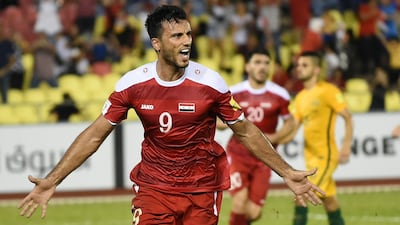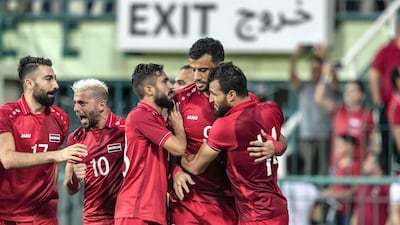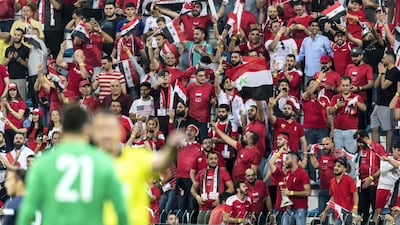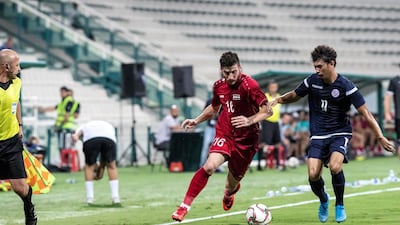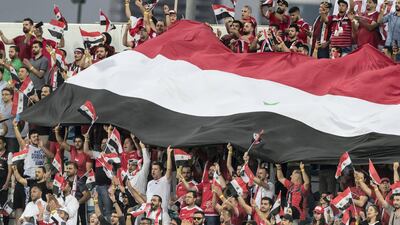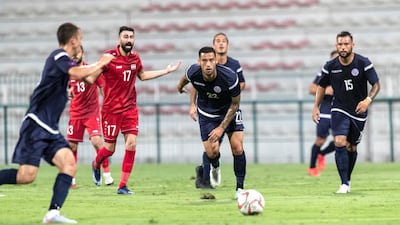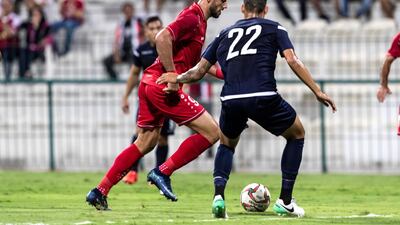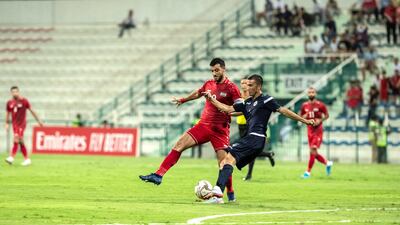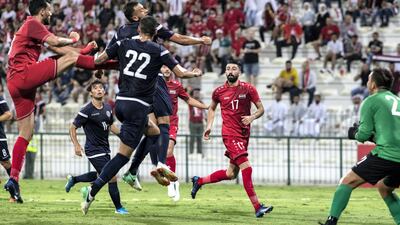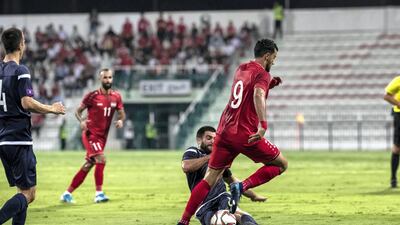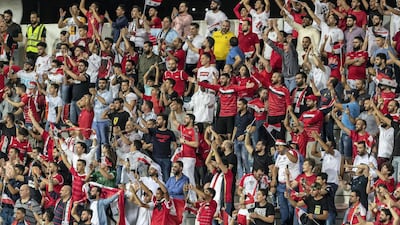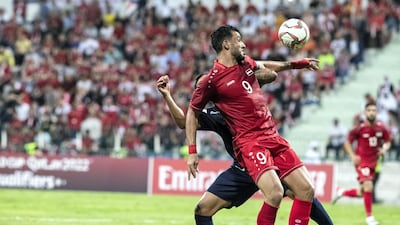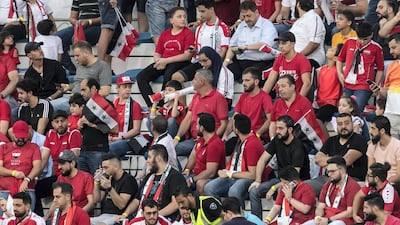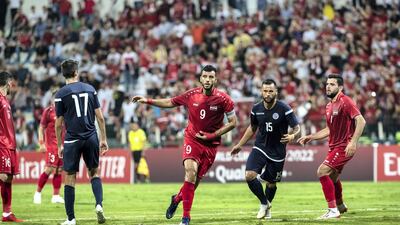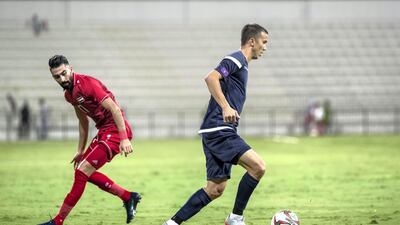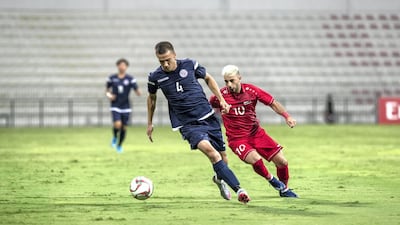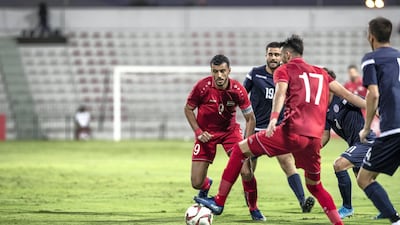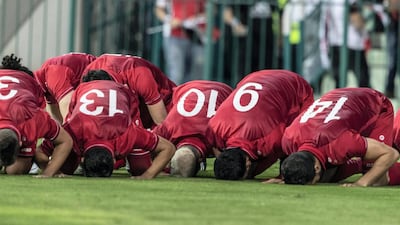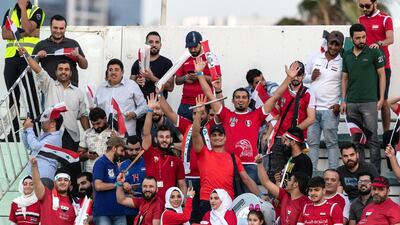Omar Al Somah watches back a video of what he considers the most significant of the hundreds of professional goals he has plundered and, for the first time during the 45 minutes in his company, he falls silent.
He watches as he scores against Iran in late 2017, a debut goal deep into injury-time in Tehran, equalising the match and ultimately keeping alive Syria’s chances of reaching a first World Cup. He watches as his teammates swamp him in the corner of the Azadi Stadium pitch, joined immediately by substitutes and members of the Syria bench.
But Al Somah is listening, too. For the goal will be remembered also for the commentator calling the action; for the moment Al Somah squeezed home his shot and the point was secure and the Asian play-off made possible and the realisation that a country ravaged by civil war might just emerge on football’s grandest stage.
For the moment the commentator, lost in the emotion of it all, broke down in tears. The video quickly went viral. It soon had more than 1.2 million views on social media. Eventually, it swelled to more than two million.
Watching and listening now, clearly it still resonates with Al Somah.
“There is a story behind this video that no one knows about. I will talk about it for the first time,” says the striker, who at the time was making only his second international appearance in five years.
The political situation in Syria prevented Al Somah from representing the country between 2012 and 2017 and he returned days before, in the 3-1 victory against Qatar in Malaysia (the war obstructs the national team from playing matches at home). Victory in Tehran would guarantee the team a two-legged Asian play-off and move them to within a step of the intercontinental play-off that guarantees a World Cup place. It could even send them to Russia, should South Korea lose their final qualifier against Uzbekistan.
Two-one down to the group winners and with 90 minutes already elapsed, Al Somah struck when all seemed lost.
“Before the match, people were cheering, ‘We want Omar, we want Omar,’ so when I come, I do nothing and this makes me feel bad,” he says. “The match was decided. So I had to do something, I had to help the team win.
“At that moment, I was only praying. I was praying to Allah during the last five to 10 minutes to accomplish something in this match. Then the ball came to me. I was so anxious I have not had any opportunity. I kicked it with a first touch; it is hard to kick a ball like that. Praise to Allah, I was successful.”
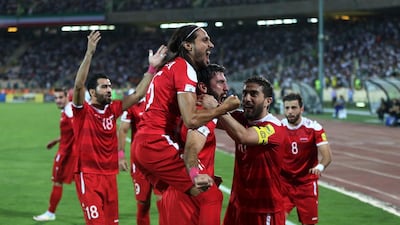
Al Somah and teammates did not know what was happening in the other Group A match, that South Korea were held to a goalless draw in Uzbekistan. A point in Tehran was enough for a play-off. Against all odds, Syria’s improbable run had sustained.
“We were so happy on the bus on our way back to the hotel,” Al Somah says. “People were dancing and cheering. I watched people [online] on my mobile. Syrian people had not felt that happy since the beginning of the crisis, for seven years. I was watching how people were happy in all provinces.”
When the team arrived back at their hotel, they sought out the head of Syria’s General Sports Federation. Al Somah had a few days until he needed to return to Al Ahli, his club in Saudi Arabia, so asked if he could fly with his teammates to Syria to share in his compatriots’ joy. A flight was promptly arranged.
“I had not been in Syria for seven years,” he says. “I visited my homeland and saw how people were happy. We were on TV. The president honoured us. These were wonderful moments.
“I've scored nearly 250 goals and this was the most important goal in my life; not the most beautiful but the most important because we reached the play-off. I pray we strike another more important goal in the World Cup finals.”
Even now, Al Somah's pride is evident, two years on and despite Syria's wait for an appearance at a World Cup continuing. They went on to lose the play-off to Australia, when Al Somah struck in the first leg to secure a 1-1 draw and was the width of a post away in the return match of carrying his country through. In the final minute of extra time, his free kick cannoned back off the hosts' post. Australia prevailed 3-2 on aggregate.
Back in Syria, people used an impromptu public holiday to congregate around television screens erected in streets. For 90 minutes at least, for the first time in years, something other than bombs and bullets occupied their minds.
Al Somah is grateful that he helped offer some relief.
“This goal against Iran and the match caused many changes in Syria and the Syrian people,” he says. “This goal resolved many things after the crisis. Praise to Allah, I was the reason [behind the change]. I have been blessed and this was my first goal. Imagine how things would have been if I had not scored before the match ended.”
If ultimately it wasn't enough, Al Somah has set about making amends in Syria's quest for the 2022 tournament. Three matches into the second stage of qualification, he has seven goals, securing three victories for his side and hoisting them to the summit of Group A. He is the lead marksman and leader on the pitch as well, captain of his country and carrier of its dreams of reaching that global finals. It is a burden he seems to wear well.
“It is not [only] the team, but the whole country depends on me,” Al Somah says. “I always receive messages on social media or from people, who see me in the street, telling me ‘You have a responsibility, we are counting on you, after Allah.’
“The players are the same, because I scored the final goals in the play-offs and in the last minutes against Iran. Most people cheer ‘Omar, Omar, Omar’. This is not stressful, but a great motivation. There is a lot of pressure around me, but I don’t pay attention to that. It does not affect me at all.”
_________________
Al Somah scores hat-trick against Guam in Dubai
_________________
That comes across throughout the course of this extended conversation. It takes place in the presidential suite of a Dubai hotel, which feels fitting considering Al Somah’s stately stock in Gulf football and across Asia. He is the highest-scoring import to have played in Saudi football, with 149 goals in 161 games since joining Al Ahli in 2014 following a trophy-laden few years Kuwait’s Al Qadsia. In 2015/16, Al Somah scored 27 goals in 22 league matches as Ahli were crowned Saudi champions for the first time in 32 years. With it, he clinched a second successive Golden Boot. The next season, he added a third.
At 30, Al Somah is nestled among his peak professional years, tall and lean with an easy smile and a sincere manner. He wears a black baseball cap, a plain white T-shirt and black shorts. He drinks maté, the South American drink made popular in Syria, from what appears an authentic calabash gourd.
In good spirits, he is accompanied by his management – the Dubai-based Ghost Concept, who represent a number of high-profile Middle Eastern athletes. Announced on Monday as adidas' latest brand ambassador, Al Somah will soon launch his own website, a rarity among Arab footballers, which comes complete with a specifically created logo and illuminations as to what makes him one of the best strikers in Asia.
"I'm very excited about the website," he says. "It includes things we have not talked about before. This is nice, especially that social media, technology and mobiles are a trend nowadays."
Al Somah has most certainly embraced the trend. His Twitter and Instagram accounts boast more than 1.6 million followers each. On the former, he mixes professional life with personal: his twin sons, Aboody and Hamoody, have featured often since they were born two years ago. When the pressure of professional football and the accompanying noise gets too much, they are there, at home in Jeddah, a welcome and wonderful distraction.
“My family is the best thing in my life, especially my children,” says Al Somah, visibly lighting up as he looks at a picture of the boys, perched beside him. “After losing a match, I forget everything when I see them. Once, a father brought along his children to the club and told me he travelled 500- or 600km just to take a photo with me. I asked myself why he would do that. When I had kids, I started to understand why.
“One would do anything to make his children happy. My children are my weak point.”
It is touching, his pride almost tangible. Al Somah laughs at the suggestion the boys won’t yet understand how dad is a major star, but agrees he would one day encourage them to follow his path. “Abood”, especially, plays football all the time, thumping balls into the little goal at home. He could be another top forward in the making.
“Inshallah … inshallah,” Al Somah smiles. “For sure he will play only as a striker.”
Maybe goalscoring is in the genes. Al Somah has seemingly always had it, from the days spent as a youngster at Al Futowa, his hometown club in Deir Ezzor, looking up to players past and present.
Today, it’s Cristiano Ronaldo and Lionel Messi, although given Al Somah’s affinity for Real Madrid, the Portuguese just about edges it.
“What Cristiano and Messi have done is unprecedented,” he says. “I cannot predict, but I am sure no one can be up to them. They have done something no one understands, scoring unique goals, ones I've no idea how they did. We try to copy them but we cannot.”
Now aspiring footballers attempt to mimic him. The secret to Al Somah’s success, he believes, is an alchemy of natural talent and tireless determination.
“It was gifted since childhood,” he says. “A footballer can improve in anything except scoring a goal. This is heavenly, a God-given gift. Training reinforces this talent.
“A striker has intuition. He can tell where the football is going even before it is off the ground. Some people say I am lucky; I am not lucky. I know the ball is coming this way. Look at Messi and Cristiano: the ball comes to them; it loves the player who knows how to score. Not all players have this scoring sense. If you look at the most expensive player in the team, it’s always the forward.”
That feels particularly applicable to Ahli. After four seasons, Al Somah remains the team’s figurehead, entrusted with the armband, leading from the front in every way possible. Of the nearly 150 goals for the club, the overhead-kick in the derby against Al Ittihad in March ranks, not surprisingly, as his favourite.
It encapsulated Al Somah the striker: the power and the precision, the athletic agility married to a sense for the spectacular. Little wonder he is nicknamed the “Syrian Ibrahimovic”.
“I practised overheads a lot since I was young, and I scored many times,” he says, half joking. “Even in Syria. But there were no cameras.”
Evidently, all eyes are on him now. In truth, they have been for some time. Through the trophies with Ahli, the persistent pressure, the praise and the plaudits. Understandably, age 30 and looking fit and focused, he wants more.
“I've won four local championships with Al Ahli, been three times the league’s top scorer and now am the best scorer in Al Ahli history,” Al Somah says. “Besides the championships, I also have a personal goal to become the all-time top scorer in the Saudi league. There’s still around 80 goals to go.”
Maintain the current rate, and that might not take too long.
“It requires three seasons,” he calculates. “Inshallah, I can get it in three to four.”
Al Somah will hope by then to have flown Syria’s flag at a World Cup. He understands the road to Qatar is long, that more difficult ties come should Syria advance, as expected, to the third round of qualification. That, once more, they will be regarded as underdogs.
Playing home fixtures in Dubai undoubtedly helps – “we feel like we are playing in Syria. This makes a huge difference and greatly motivates us” – as does the band of emerging players whom have graduated from the country’s Olympic team. So, too, that Al Somah is available from the onset.
Even considering all he has accomplished thus far, guiding Syria to football’s apex would undeniably constitute his pinnacle.
“Of course, this is the biggest tournament in the world; the most viewed,” Al Somah says. “All football players, with no exception, have dreamt to make it to the World Cup. It is the talk of the town, the people’s dream.
“Every team who did not make it dreams of getting there. Personally, I've lived that dream since I was a child. I’d love to play with the team until I reach the World Cup. Inshallah, we can realise that dream.”
